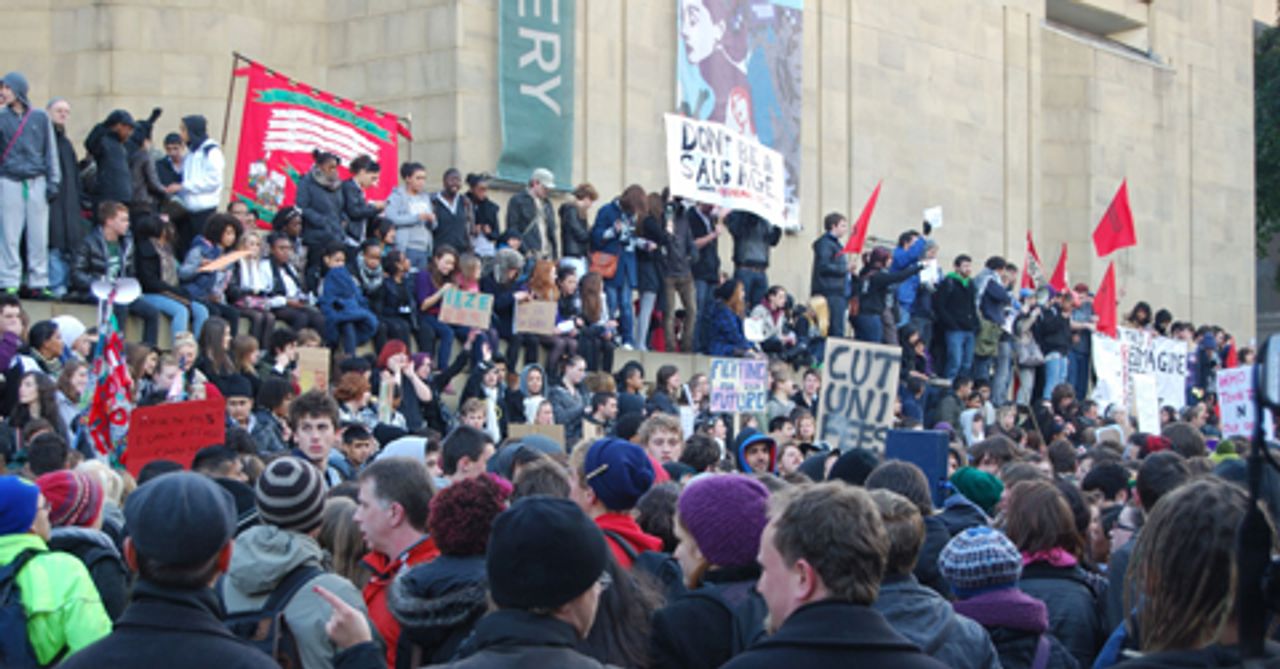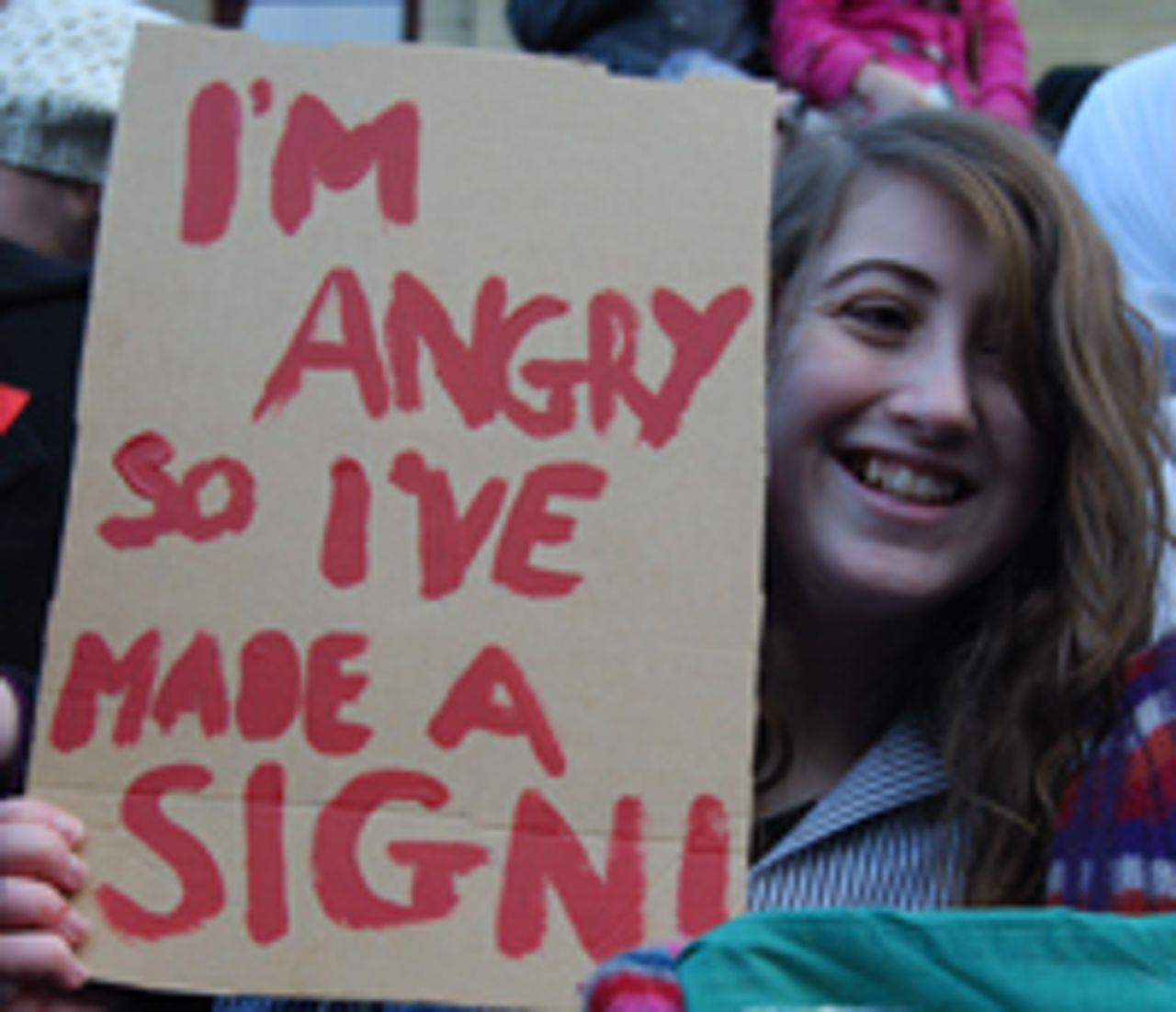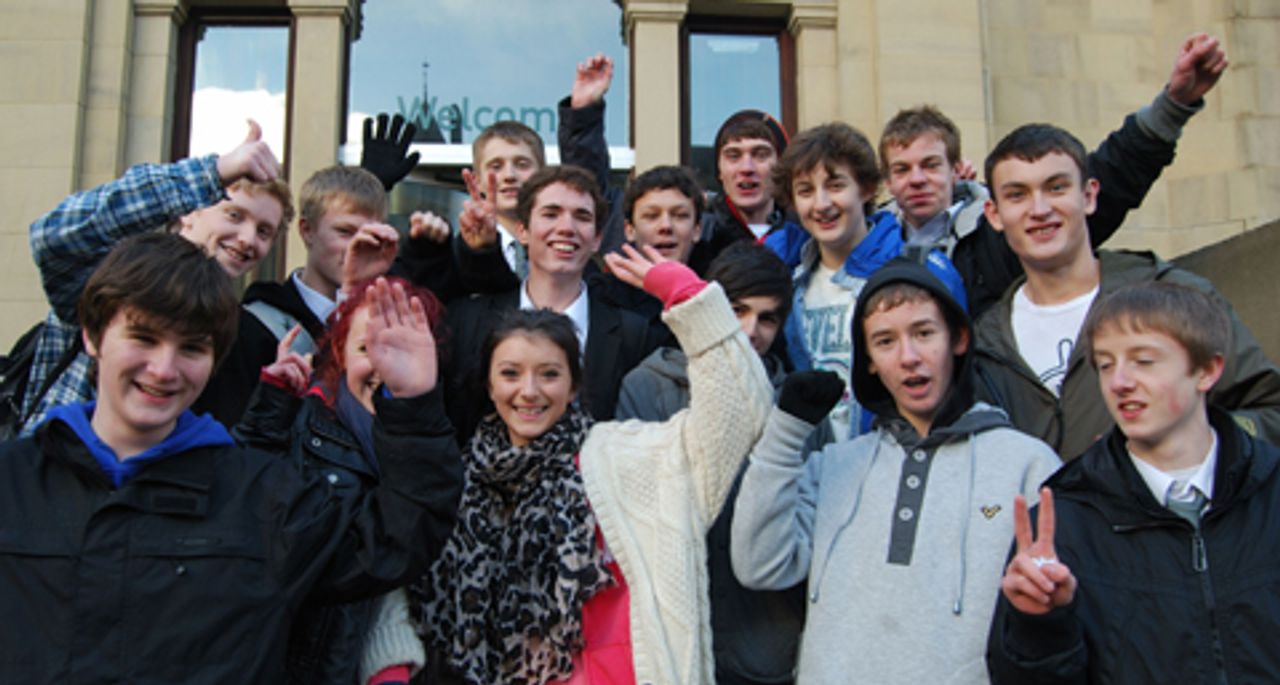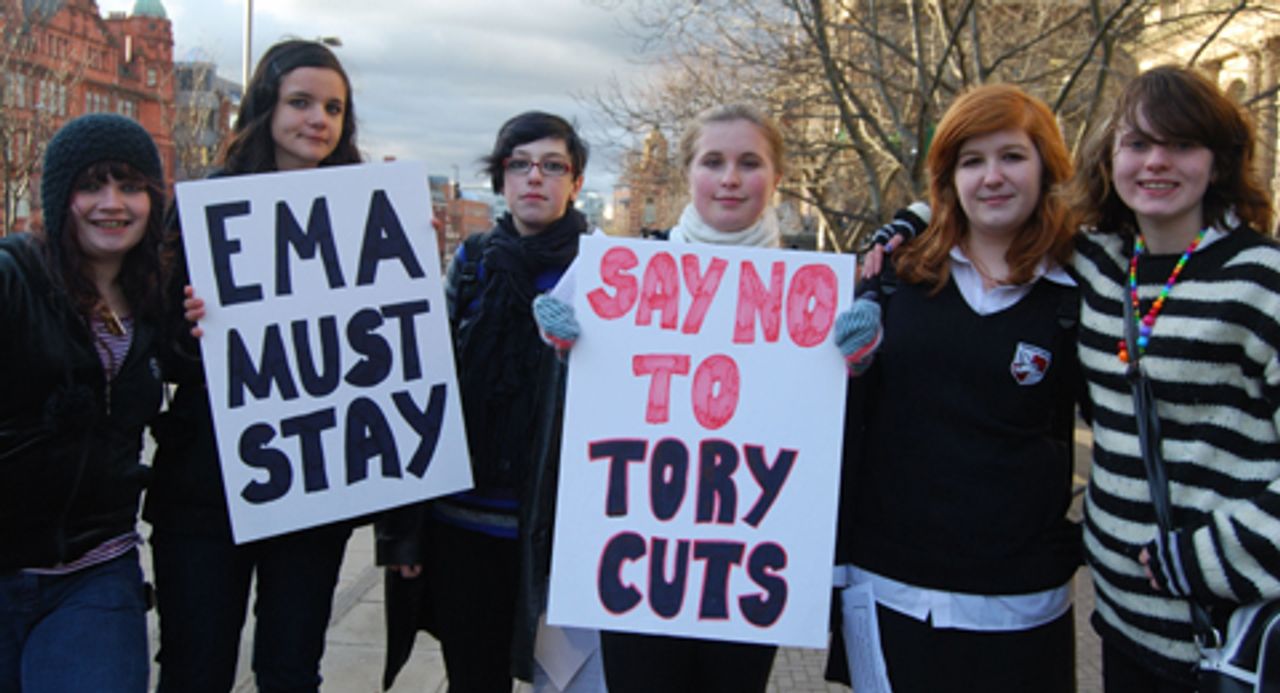On Wednesday thousands of students, sixth formers and school pupils demonstrated throughout the UK to protest the governments’ education cuts. Teams from the International Students for Social Equality and the Socialist Equality Party spoke to some of those taking part.
More than 4,000 students from the University of Leeds and Leeds Metropolitan University marched into Leeds city centre. There was a very strong police presence all along the route, with eight video filming vans, other police video teams on roof tops, at least 10 police dogs and six mounted police as well as hundreds of police on foot.
As they marched through the city, office workers gathered round the windows and cheered them as they passed.
 Demonstrators protest outside Leeds Town Hall
Demonstrators protest outside Leeds Town HallThe demonstrators were met on the steps of the Leeds Art Gallery by up to 1,000 school and further education college students, who had walked out of classes in support of the campaign.
School students from Allerton Grange Comprehensive School had marched five miles into the city centre to attend the rally. On their way they had picked up fellow students from Roundhay Comprehensive. As they passed the Leeds College of Building and Thomas Danby College, students came out to greet them.
 Alex
AlexAlex from Allerton Grange School told World Socialist Web Site reporters, “These cuts affect school students, not just in the future but right now. The loss of the Education Maintenance Grant (EMA) of £30-a-week for school students is outrageous. The increase of university fees to £9,000 means that the dream of higher education is being taken away from millions of youth, especially from poor families. My mum is very worried about the situation. We are fighting for our future.”
Seyamak, also from Allerton Grange, said, “I think that education is a right. We are the students of the future. I don’t see that you can set a price on education in a civilised society. Education is a class issue. Bailing out the banks should not come at the top of the agenda. If you take away the right to education, what are you left with?”
 Students from Ilkley Grammar School
Students from Ilkley Grammar SchoolStudents attended from Ilkley Grammar School, travelling 15 miles to get there. They had not known anything about the day of action until their parents received letters through the post from their headmaster warning them of the event and saying they could not take responsibility for what happened to the students if they walked out of school.
One of the pupils explained that in their school staff members had been posted at all the exits. They simply waited until the teachers had gone to their classes and then walked out.
Chris, a guitar student from Leeds Music College, said, “These attacks are international. They are happening everywhere. Cultural activities will be one of the hardest hit areas. According to the government, society cannot afford culture. But everybody has the right to cultural expression, in music and every other form. People need culture.”
Dave, a master’s student at Edge Hill University in Ormskirk, said, “This is not so much about my future because my education has been paid for. I’m here because it’s a fundamental right that you have free education. My parents could maybe have afforded these rises, but a lot or ordinary people can’t. That is why I’m here. It’s the next generation. It’s my kids and everyone else’s kids that are going to feel it.”
Gayle, an unemployed worker who supported the students, had been a domestic worker at Boddington student hall of residence and had been made redundant on September 30. She said, “Loads of other cleaners at the university were sacked in July. I have since tried to get another job but can’t get one anywhere.”
Her daughter is a 20-year-old student who is presently in further education. She is not living at home and is sleeping at various friends or relations. Gayle said, “She is suffering badly. She is entitled to nothing except the £30-a-week EMA and when the government stops that she will literally be penniless. She has to provide for food, clothing, and all the necessaries and yet despite everything she is still managing to go to college. She wants to study Law and Criminology and has a place at Leeds Metropolitan University. But who knows what is going to happen? All governments now are not helping anyone. Even if Labour was in she would get nothing.”
Another protester at the rally said, “University education should be free for all who want to seek it. Putting up the fees even further will discourage millions from poorer backgrounds. I qualified in 2008. I had to pay £1,200 a year fees, plus a £3,000 repayable loan and now I am burdened with debt. In future students will have to pay almost the same amount towards one year’s fees.”
 Natasha (right) and her friends
Natasha (right) and her friendsNatasha from Lawnswood High School said, “If they cut EMA and raise the entrance fees we won’t be able to afford university. And even if we go to university, we will come out with bills of £80,000 and more. The future will be McDonalds if we don’t get into university.”
One of her friends said, “We have to think about when our generation is the working generation, who is going to pay the taxes for the people that are retiring?”
Another said, “They are cutting EMA and they are cutting arts and sports programmes, but they are not cutting the Ministry of Defence and nuclear weapons which is ridiculous. They need to get their priorities sorted out.”
Before the march into the centre of Leeds began, Barbara Slaughter, a veteran Trotskyist who spent most of her working life as a teacher in Leeds, addressed the students. When she introduced herself as a representative of the World Socialist Web Site, the organisers of the demonstration switched off the microphone, saying “This is a non-political march. We don’t want anything to do with politics. You are not allowed to raise left-wing ideas on this march.”
They were forced to allow Slaughter to speak, with one student hearing the altercation leaning over and switching the microphone back on. In her remarks she drew attention to the leaflet being distributed by supporters of the International Students for Social Equality, warning that the police were using the events at Millbank Towers last week to whip up an atmosphere of hysteria to justify the use of brutal police tactics against future demonstrations of both students and the working class.
She said, “Under conditions where nowhere in the world do working people have a political party that represents their class interests, what is required is the building of an independent party of the working class.”
In Manchester around 5,000 protesters, including students from the University of Manchester, Manchester Metropolitan University, as well as hundreds of pupils from schools in the city and the wider region, marched from the main university area into the city centre. A group of sixth form students came to Manchester from Kendal in Cumbria, 76 miles away.
The ISSE statement was the only leaflet being given out on the demonstration and one student volunteered to take leaflets to distribute.
The march was met by a heavy police presence, which attempted to divert it away from the Town Hall.
Owen, a sixth form college student, said he felt none of the main parties would oppose the cuts, “which are denying education to the poorest in society”. He agreed with uniting the struggles by all sections of workers, “as they are all connected.”
Another student in a group from Trafford College said, “I have worked hard all through school and at college and I don't think I will ever go to university. I think it will all be for nothing.”
She pointed out the growing unemployment among these who were well qualified and experienced and asked, “What chance have we got?”
Fill out the form to be contacted by someone from the WSWS in your area about getting involved.
